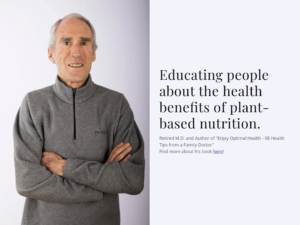 POLYCYSTIC OVARIAN SYNDROME (PCOS)
POLYCYSTIC OVARIAN SYNDROME (PCOS)
Health column by Dr. Greg Feinsinger. Champion of Whole Food Plant Based Living and righteous person.
This column is another in a series taken from Dr. Neal Barnard’s recent book, “Your Body in Balance, The New Science of Food, Hormones, and Health.” Androgen is considered to be a male hormone, but women have small amounts. The ovaries and adrenal glands of women with PCOS produce too much androgen.
PCOS affects 5-10 percent of reproductive age women. It is characterized by: 1) failure to ovulate, with irregular and sometimes absent periods; 2) infertility; 3) unwanted hair growth of body hair; 4) acne; 5) an overabundance of belly fat; 6) insulin resistance, resulting in pre-diabetes and diabetes); 7) hypertension; 8) lipid abnormalities such as high triglycerides and low HDL (good cholesterol); 9) increased risk of cardiovascular disease; 10) increased risk of cancer of the endometrium (the lining of the uterus); and 11) multiple cysts on the ovaries.
Medications are available to treat problems such as unwanted hair, insulin resistance, and infertility. But Dr. Barnard’s book cites research showing that proper nutrition can treat PCOS more effectively than medications and without the added expense and side effects. Following are his recommendations for treating PCOS “naturally”:
- Weight: Most women with PCOS are overweight and in particular have too much belly fat. As discussed in previous columns, fat cells produce estrogen and androgen hormones.
- Controlling hormones: Losing weight will help get hormones in balance, but fiber plays an important role in this as well. Excessive hormones are removed from the blood stream by the liver, and end up in the GI tract. With a low fiber diet, the hormones are absorbed back into the bloodstream, but fiber traps the hormones which are then expelled in the stool.
- Blood sugar control: Losing the belly fat and fat in muscle and organ cells is the cure for insulin resistance and therefore pre-diabetes and diabetes.
Here are Dr. Barnard’s food choices for reversing PCOS):
- Avoid animal products, including meat, chicken, fish, dairy, and eggs. Instead eat a diet rich in fruit, vegetables, whole grains, and beans—all of which contain abundant fiber.
- Avoid fatty foods and added oils, including vegetable oils (oils are a fat, are processed, and contribute to weight gain).
- Eat foods with a low glycemic index—the measure for how much different foods cause blood sugar to rise–which contributes to insulin resistance and diabetes. Avoid refined grains, although whole (unprocessed) grains are fine. When shopping for items made from grains, such as cereals, crackers, bread, and tortillas, look for products with a total carb to fiber ratio of 5:1 or less (multiply the fiber number by 5 and if the result is greater than the number for total carbs, that product has lots of fiber and whole grains).
- Eat soy, which has been shown to lower excessive androgen levels in women, to reduce insulin resistance, and to block storage of body fat. Even soy milk helps, although the least processed soy is edamame (soy beans—organic frozen ones can be found at Natural Grocers and sometimes City Market). The second least processed soy product is tempeh, followed by tofu. Other legumes such as other lentils, chickpeas, and other varieties of beans offer similar benefits.
Leave a Reply